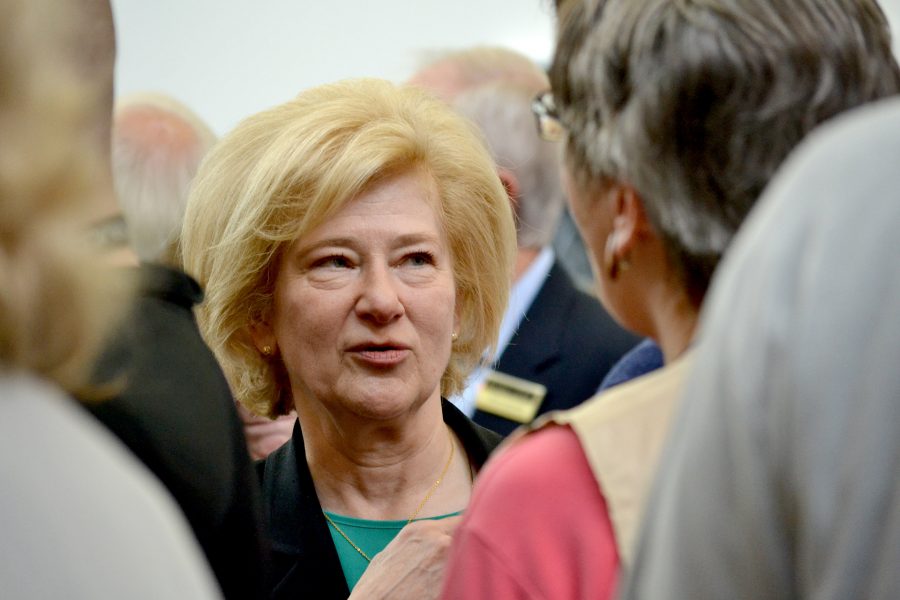Q+A: Rondeau and Mazzochi talk about the future of COD
May 11, 2016
On May 6, future College of DuPage President Ann Rondeau, Chairwoman of the COD Board of Trustees Deanne Mazzochi, and Student Trustee Luzelena Escamilla sat down with the Courier’s News Editor Lucas Koprowski to talk about communicating with the COD community, and dealing with issues like accreditation and the split board.
Courier: How will you spend your first day as president?
Ann Rondeau: My first day is going to be walking around and meeting as many of the students as I can and having them get to know me, putting a face to the name. I will go around and listen, watch and make it a full sensory experience. Our most important issue is before that first day, I’m going to have been prepping up on HLC (Higher Learning Commission) accreditation. The first day is the first day that is visible, but we’re going to spend May and June continuing to work with HLC. That’s the first thing we got to do.
C: Will the HLC be the first issue that you address?
AR: Yes. That’s important for you. It’s important for you and the faculty to have an accredited institution. Everything else will follow. We’ve got to pass that exam. We are going to do that, and everything else is built upon that. That’s the big muscle.
C: What do you think of the vote count, four “yes,” two “present” and one “abstain,” that led to you being selected as the next president?
AR: I’m delighted that the majority went in my favor. So the vote was the vote. I am delighted that four of the trustees are confident in my selection. The fourth vote is the one that counts, so in the end I was voted for, and I am delighted, pleased and happy to be here.
Deanne Mazzochi: I would just like to note from a procedural perspective; under Robert’s Rules in most governing board’s rules, when you have an abstention it counts with the majority. So it’s actually a five to zero vote because the two present votes don’t get counted in the final tally.
C: How will you deal with the split board?
AR: I report to the board, and the board gives me my objectives and vectors. I report to them. I am fine with differing opinions. Differing opinions are a good thing! As long as it’s intelligent and informed and helpful to the institution. For me, the board is elected by the people. These are elected officials, and they are my board. What’s important for the students and school to understand is that the chairman and the vice chairman, and the four reformer trustees along with the student trustee, are really doing masterful work at making the college their first priority. That’s really important. The student should feel very confident, as I do, that we’re on a good track with the board, and the president and the board are working all together. I mean, there’s always going to be some issues, and there are issues with this board, but I believe that the majority of people have good will. So that’s going to work out.
DM: And I would also like to say that we as a board should never be expected to be completely unanimous. We all have different frames of reference that we bring to the board. We all have different perspectives, and it’s a good thing that we can have a healthy debate on various issues. So it shouldn’t be disconcerting that we don’t have completely unanimous votes all the time.
What matters is that we’re getting the college’s business done. What matters is that all the trustees believe they have the ability to express their voice as a member of the board and during our board meetings, and that they believe their vote is counted, and if a good idea is advanced, it’s not going to depend on who advanced it. It just matters that it’s good policy or not, and I think as long as everyone comes to the table with that perspective we will be fine. Likewise, I do hope though that every trustee views Rondeau’s appointment and joining of the college as something that we can reflect a new day here at the college, and behaves accordingly.
AR: The chairman and the vice(chairman) have really done a fine job at making sure there is a voice across the board, and that the process is here, and that the students are being assured that the process is going on.
And she’s right. We don’t need 100 percent approval all the time. As a matter a fact, I’m extremely uncomfortable if everyone is in agreement all the time. It’s just not healthy in a place that values different opinions. It’s how people present that. So even with students, if you are trying to present a different point of view, you want to do it in a way that is intelligent and informed and professional in a certain way. That’s the same thing you would have from the board. What you don’t want from a student in a classroom is to be making ad hominem arguments, or to be saying different things that are not relevant to the question at hand. What I need as a president is a board that has those intelligent and informed and useful debates. That will make us stronger. The chairman and the vice chairman have been really good at trying to work that. The student body should feel confident that there’s focus on the right thing.
C: How will you gather student opinion?
AR: I will tell you that our student trustee Lucy (Escamilla) and I are going to be talking about that. She has already raised this with me. She has impressed upon me how important it is to get greater student engagement and a wider student voice. I don’t know yet the mechanisms for doing that, but you have my commitment to doing it. I just don’t know how, and Lucy and I will be discussing along with your student leaders, so it’s not only your student trustee but your student leaders. We’ve got a number of them with whom I want to meet and understand, because I want to be where they are. I’m not going to ask them to be where I am. I need to know where are you, where do you want me to be and how do you want to talk about things. I’m happy to do that. I am committed to it, and you have my promise to that. I’m just not ready to execute because I don’t yet know what that means.
DM: Just so you know, we consider the Courier as a part of student leadership.
AR: It is! She’s right! It’s a voice. So you are important to us. You are important to me, and I need your help, and I want your help, and we need your help. You are a reflection, as well as a voice, and indicator; you are a place people will go because they don’t think they have a voice or because they want you to be their voice. I’ll be reading the Courier all the time as a voice for the student body. The chairman is exactly right, you are part of leadership because you help lead the culture. Leaders set tone, and leaders set culture. You are part of the cultural health of what they see for the learning experience and student outcome. They’re key. They are really key. They’re important. They are essential. So my job is to make sure that I help them succeed. If they are succeeding, then I am succeeding.
How will you connect with faculty?
AR: First of all, the faculty are extraordinarily important to student success. Everything we can do to make student outcomes in their learning experience good is what I’m after. We’ll have dialogues and listen to them. Things come up all the time. They are the closest to the students in terms of people who are accountable here. I want to listen and hear what they perceive and what see for the learning experience and student outcome. They’re key. They are really key. They’re important. They are essential. So my job is to make sure that I help them succeed. If they are succeeding, then I am succeeding.
C: Many of the faculty were appreciative of the board of trustee’s decision when they announced your name to be the candidate. Why do you think you were really appealing to the faculty?
AR: First of all, I was grateful for that reaction. Please know that. I am grateful to be here. I’m grateful for the reaction. I’m grateful to the board. I think that when people believe, at least they want to believe, that you’re there for them and that you’re going to make things work. I think that good people want that to happen. Somehow that connected, and I’m grateful that it did. I respect them completely, and I’m just thrilled at the opportunity to be around them, because they’re around students, and I am committed to them. So I think that it’s going to be a good journey for the college.
DM: If I could build on that, the cheers and the positive feedback that we’ve been receiving hasn’t just been from faculty. It’s been from students. It’s been from staff. It’s been from the administrators. I think that’s very much a testament to Dr. Rondeau because she has this record of integrity and excellence that can bring some innovative ideas to the college and help us work at things in a new way so that we can get better. I think that is a tremendous opportunity for us to really restore some institutional trust amongst all of our shareholders. I think I can speak on behalf of many of the board members that quality is something we perceive and we recognize, and that’s something that contributed to the decision that the board made.
AR: So Lucas, you’re at an important time in this college’s life. You are, and you’re a leader in it, to get to the chairman’s other implied point. This is an extraordinary time for this college to embark on its 50th year and become nationally known as the best community college in the country. It’s going to take us some time, but the building blocks are there. You’re part of that. Everybody who is here today will be able to look back at their alma mater and say, “I was part of that. I saw us go through an institutional crisis, but we made it work, and they made it work.” Every student is part of it. Demand of us what you will that is appropriate, and that is useful to the growth of this college. Ask us in the right way for those kind of things, because as we’re stronger it helps you.
It’s interesting Lucas, since getting this job, I was saying to the vice chairman today I got two Facebook and two emails who said, ‘Hey! I went to the College of DuPage,’ or, ‘My mother went to the College of DuPage. It’s coming out of the woodwork. You’re part of an interesting time for evolving to a better place.
C: Any final comments?
Student Trustee Luzelena Escamilla: I’m very happy to have Dr. Rondeau at this new transition point. I think she’s really implementing on student success, and I think that’s very important for all students. She gets time to know you, what you want to study, how you’re going to get there, and I really appreciate that.
AR: [Lucy has] been essential as my initial navigator and guide to the students, so I’m really grateful to have her guidance. the college. You are a leader, and I need your help. Talk to me, and make sure I’m listening.


















